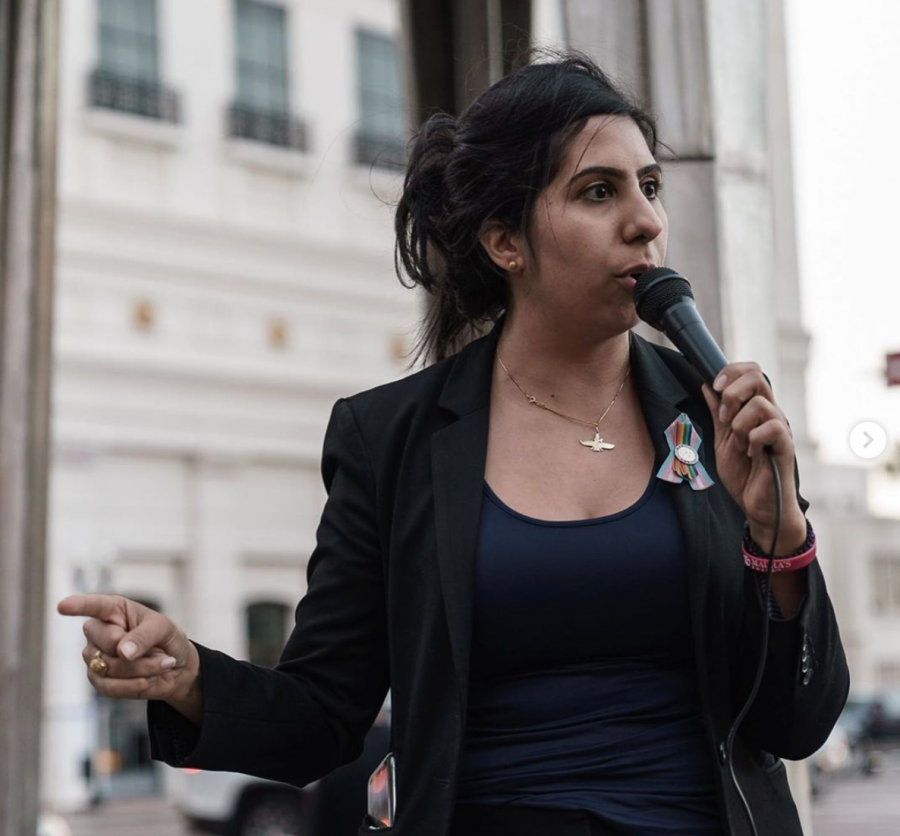Rep. Anna Eskamani Discusses Tension between U.S. and Iran
Emily Wray via Eskamani’s Instagram
Rep. Eskamani speaks at Thursday’s anti-war rally in Orlando.
January 10, 2020
After the attack on the U.S. embassy in Baghdad by an Iranian-backed militia, the retaliatory assassination of Iranian General Qasem Soleimani by the United States, and the subsequent retaliation by Iran’s government with rocket attacks on military bases housing American troops – with no reported casualties – tensions between the United States and Iran haven’t been this high in years.
On the other side of the world, Rep. Anna Eskamani (D) was elected in 2018 to represent District 47 in the state legislature – the first Iranian-American to hold a Florida public office. Eskamani was born in Orlando, after both her parents immigrated to the United States from Iran.
The Valencia Voice reached out to Rep. Eskamani for insight into the situation. She explained that it’s “not necessarily the person that was killed, but what feels like President Trump’s rash decision-making that really didn’t encapsulate potential repercussions.”
The President has received both praise and criticism for his call to have General Soleimani killed – some saw it as justified because of Soleimani’s actions that have killed U.S troops in the region and expanded Iran’s paramilitary presence. Some in the U.S. thought that the assassination could entangle the nation in another Middle Eastern war. Rep. Eskamani herself spoke at an anti-war rally in Orlando on Thursday.
In Iran, Soleimani was considered by many to be a hero for, among other things, his campaign against ISIS.
When asked about Iran’s retaliation, Eskamani, explained that she was concerned that both American and Iraqis lives would be impacted. She was fearful that if American lives had been lost, it would “lead to another escalation by the United States, which then continues this “tit-for-tat” cycle that could really lead us to an endless war.”
Eskamani reminded other Iranians living in the U.S who might be fearing backlash, “you’re not alone,” and that they have “a community around you, whether they’re Iranian Americans or non-Iranian Americans.”
The representative has visited her family in Iran about three times since 2005; her last trip was approximately 14 years ago. She explained that her Iranian family members are worried and “don’t want war. They have made that pretty clear.”
She added, “[Her family members in Iran] don’t trust President Trump. They definitely see him as very volatile, but of course, there’s also distrust towards their own government.”
According to Eskamani, 60 percent of the Iranian’s population is under the age of 30.
“These are folks that demand more of their government, so they’re kind of caught between two worlds and two different governments that punish them without a reason,” she explained. “So whether it’s Iran that lacks modern policies, that censors, has human rights violations and squashes protests or it’s the United States of America that has Muslim travel ban, has put sanctions in place that’s really been economically hard for Iran and people in Iran and has a president who is kind of unpredictable, irrational, and made comments about bombing cultural sites in Iran.”
Eskamani also said that she felt frustrated that the U.S. exited the 2015 Iran Nuclear Deal. “It feels like we’re starting not from point 0 but from point negative 25 because the relationship has been so damaged that there really is no trust between the two negotiators in this: the United States and Iran.”
Eskamani thinks that a path towards de-escalation would be “to go to the negotiating table and talk about a new Iran nuclear deal and have a conversation with international powers.”
“Something else that Americans have in common with Iranians is that the overarching [public] opinion is ‘no to war,” which Eskamani said gives her a lot of hope.
Christian Casale contributed to this story.




